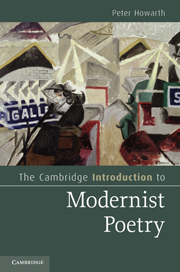Chapter 5 - Modernist America
Williams, Stevens, Moore
Published online by Cambridge University Press: 05 June 2012
Summary
Modernism and America: Whitman and Crane
Modernist poetry was not invented in America, but so many of its leading English-language poets were American that it is scarcely surprising how deeply its poetics are entwined with American cultural ideals. ‘Make it new’ was Pound's literary slogan and equally America's encouragement to all its citizens, immigrant and native-born, that the past could always be left behind and a future re-made. Like America, modernism demanded that forms of expression had to be found or chosen for oneself, rather than handed down or adopted through politeness. Breaking the rules of poetic form for freer self-expression also perfectly replayed America's democratic break from rule by the British crown, and its later citizens’ escapes from other tyrannies. Explaining why he had adopted his radically all-inclusive free verse in Leaves of Grass, Walt Whitman told Ralph Waldo Emerson in 1874 that ‘the genius of all foreign literature is clipped and cut small, compared to our genius, and is essentially insulting to our usages, and to the organic compacts of These States’. It's a beautiful metaphor: European poetic forms are like palace topiary, artificial shapes clipped by the servants, but America and its poetry can never be hedged in or belong to privilege. Forty years later, the American modernist poetry magazine Others described its ‘revolutionary’ experiments as ‘the expression of a democracy of feeling rebelling against the aristocracy of form’. Modernist poetry's insistence that formal principles and intellectual meanings could never be found separately from an ongoing experience of encounter with the material was also thoroughly in keeping with the pragmatist strain in American philosophy. Unity was always in the process of achievement for William James, for a finished state has the wrong kind of politics:
Things are ‘with’ one another, in many ways, but nothing includes everything, or dominates over everything. The word ‘and’ trails along after every sentence. Something always escapes…the pluralistic world is thus more like a federal republic than like an empire or a kingdom.
The idea that things are ‘with’ each other but never contained by any overarching system is a principle of modernist syntax and modernist difficulty alike. And, of course, the modernist techniques of jumps and montages went well with the speed and multifarious levelling of America's roaring twenties, in its newly confident cities where people from every background were mingling, where the streets were a forest of competing signs and adverts, and relays of telephone switchboards could put anyone in touch instantly with anyone else. All modern cities had these, but America was proud of being distinctly further ahead and more modern than the rest. As Mina Loy noticed after her arrival from Europe, the avant-garde's experiments with hybrid and fused language encountered their real-world counterpart in American cities:
where latterly a thousand languages have been born, and each one, for the purposes of communication at least, English – English enriched and variegated with the grammatical structure and voice-inflection of many races, in novel alloy with the fundamental time-is-money idiom of the United States. Out of the welter of this unclassifiable speech, while professors of Harvard and Oxford labored to preserve ‘God's English,’ the muse of modern literature arose, and her tongue had been loosened in the melting pot.
- Type
- Chapter
- Information
- The Cambridge Introduction to Modernist Poetry , pp. 104 - 140Publisher: Cambridge University PressPrint publication year: 2011

